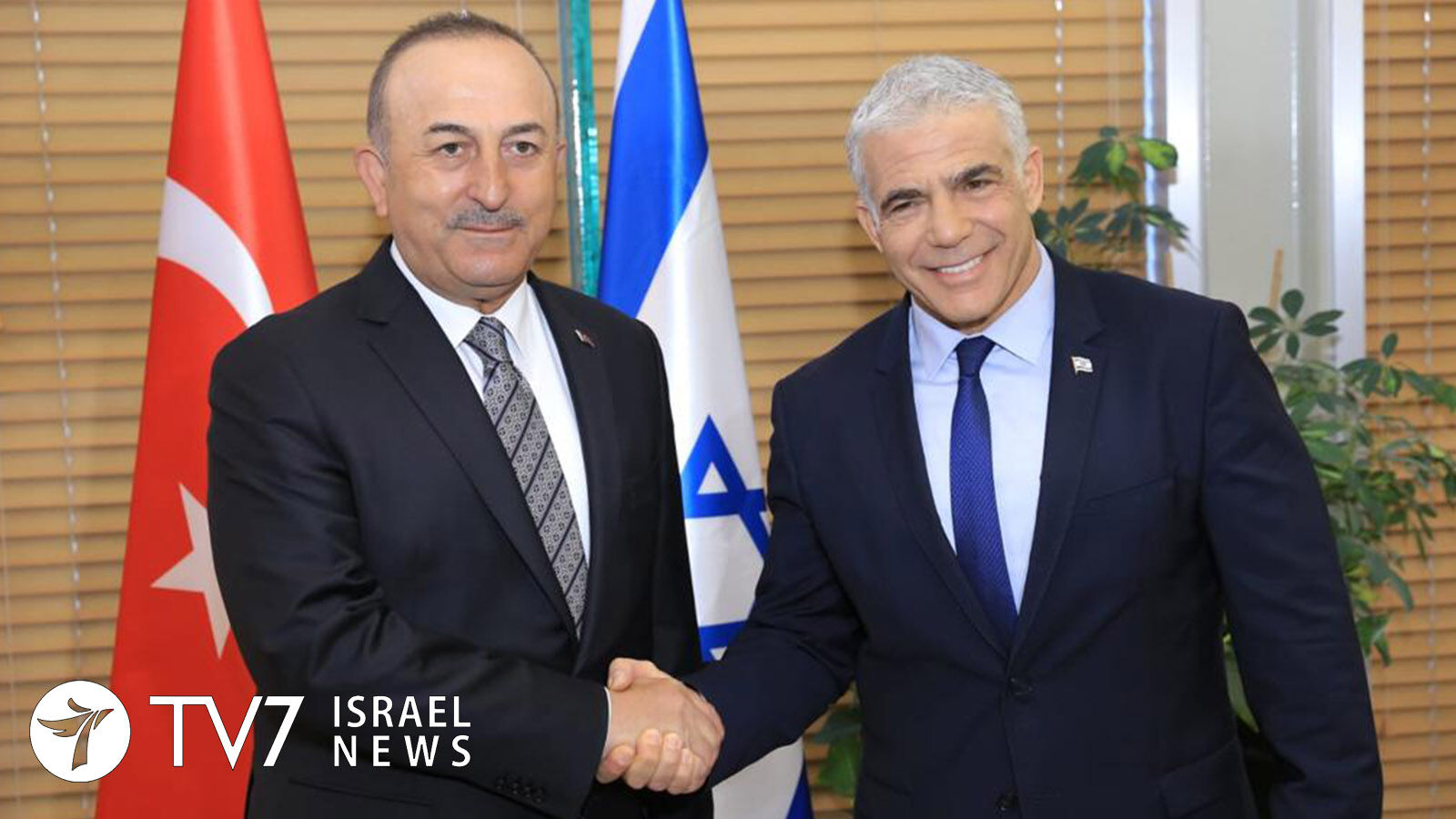Mevlüt Çavuşoğlu is on a two-day trip to Israel and the Palestinian territories that marks the first visit by a Turkish Foreign Minister in 15 years.
By Erin Viner
Israeli Minister of Foreign Affairs Yair Lapid gave a warm welcome to his Turkish counterpart Çavuşoğlu in Jerusalem this morning. Talks between the two centered on ways to further strengthening of bilateral diplomatic, strategic and trade ties.
The two nations are working to cool years of disputes, primarily over Israel’s presence on the West Bank as well as Turkish support for the Islamist Hamas terror group that controls Gaza; the culmination of which was the mutual expulsion of ambassadors in 2018 and subsequent exchange of accusations over the Israeli-Palestinian conflict.
Despite those tensions, Turkey and Israel have maintained trade, which stood at $6.7 billion in 2021, up from $5 billion in 2019 and 2020, according to official data. Turkish President Recep Tayyip Erdoğan expressed hope earlier this year that trade would reach $10 billion in 2022.
Çavuşoğlu’s arrival follows the March visit by Israeli President Isaac Herzog to Turkey in what was the first time an Israeli leader had come since 2008.
At the time, Turkish President Recep Tayyip Erdoğan expressed his belief “that this historic visit will be a turning point in relations between Turkey and Israel” and that the bolstering of “relations with the State of Israel has great value for our country.”
Turkey is particularly interested in reaching energy agreements with Israel. Erdoğan has revived an idea first discussed more than 20 years ago for his economically-challenged nation to work together to carry Israeli natural gas to Europe.
The Turkish leader has been cited as saying he is “very, very hopeful” for energy cooperation with Israel, and that he intends to discuss the issue with Israeli Prime Minister Naftali Bennett in the near future so that immediate steps can be taken to “accelerate for Israel-Turkey cooperation, east Mediterranean crude oil and natural gas” deals.
And while the Lapid-Çavuşoğlu talks have been highly anticipated, Israeli officials have stressed to TV7 that Israel’s relations with Turkey will not come at the expense of its strong relations with Greece or Cyprus.
“Mr. Minister, we won’t pretend that our relationship has not seen its ups and downs. But we remember that Turkey was the first Muslim nation to recognize Israel, back in 1949. And we have always known how to return to dialogue and cooperation. Nations with long histories always know how to close one chapter and open a new one. That is what we are doing here today,” Minister Lapid told his Turkish counterpart at the Foreign Ministry in Jerusalem today.
“We agreed that despite the difference, the continuation of our sustainable dialogue will be beneficial and this should be based on mutual respect to one another’s sensitivities” which “will beneficial not only for our bilateral relations but also for peace in our region,” responded Minister Çavuşoğlu, revealing that in today’s discussions the two diplomats also shared an “exchange of views on regional issues,” which he said he appreciated.
As part of efforts to reinvigorate the Turkish-Israeli relationship, the two Foreign Ministers agreed to relaunch a Joint Economic Commission that had been frozen for over a decade, among other decisions to further enhance economic cooperation including negotiations on a new bilateral civil aviation agreement.
“We are both expecting to see progress not only in our diplomatic and security relations, but in our economic ties as well,” asserted Lapid, explaining that the “goal is to form and expand economic and civil cooperation between our countries, to create business-to-business and people-to-people ties, and to leverage our two countries’ comparative advantages regionally and globally.”
During yesterday’s visit to Ramallah for meetings with Palestinian President Mahmoud Abbas and Foreign Minister Riyad al-Maliki, the Turkish diplomat reiterated his nation’s commitment for the “Palestinian cause.”
“The statements presented by the Turkish leadership continuously, are statements that support the continuous struggle of the Palestinian people towards ending of the occupation and having a Palestinian sovereign independent state with East Jerusalem as its capital,” he stated, underscoring that “We will continue to stand by our Palestinian brothers in their fight to become an independent and sovereign state.”
After noting that 2022 is the 74th year of the so-called “Nakba” (Arabic for “catastrophe” in reference to the 1948 re-establishment of the Jewish State) and the 55th anniversary of invasion (Israel’s capture of Jerusalem and the West Bank during the 1967 Six Day War), Ankara’s top diplomat commented, “We see many efforts that threaten the Two-State solution” which needs to be kept “alive.”
Minister Çavuşoğlu nevertheless went on to stress that Turkish “support for the Palestinian cause is completely independent from the course of our relations with Israel. I have to say that it is impossible for our Palestine policy to change but we believe that this dialogue (with Israel) can help for de-escalating the tension, like Ramadan and get the voice of Palestinians being heard more.”
In an inflammatory call, the Turkish envoy asserted “the necessity for all Muslims to protect the Al-Aqsa Mosque in Jerusalem’s Old City, regarded as Islam’s third holiest site built on the ruins of both Biblical Temples revered by Jews and Christians.
Even though Israel regards the whole of Jerusalem as its eternal capital and the center of the Jewish faith, it has observed a “status quo” arrangement that existed prior to its reunification of Jerusalem following the 1967 Six Day War that bars Jewish prayer at the compound as not to enrage Muslims. Jerusalem’s leaders have adamantly reiterated Israel’s ongoing protection of the freedom of worship for all religions in Jerusalem.
During his West Bank visit, Çavuşoğlu also chaired the second meeting of the Joint Committee of the Palestinian and Turkish Foreign Ministries, established in 2010.
